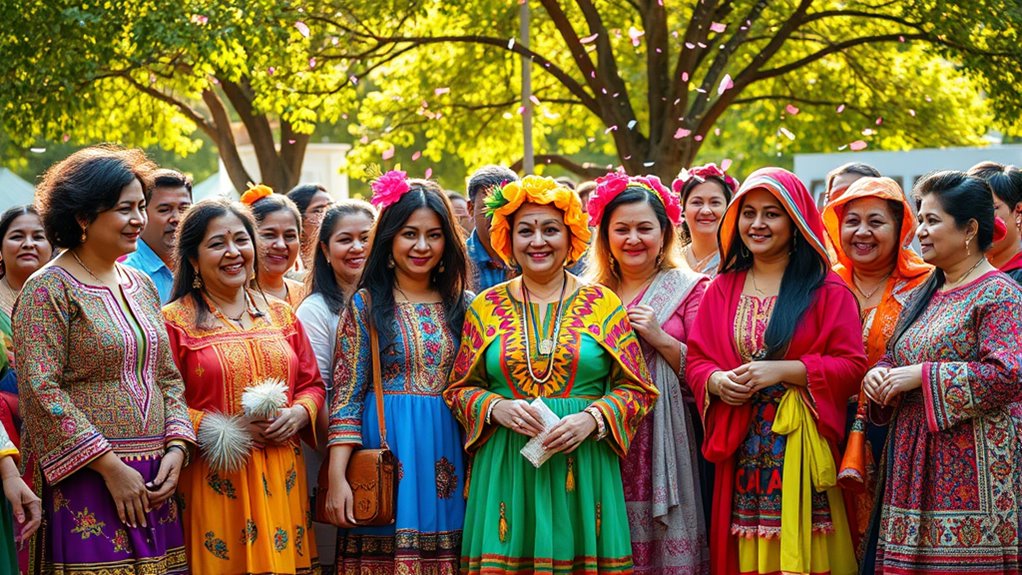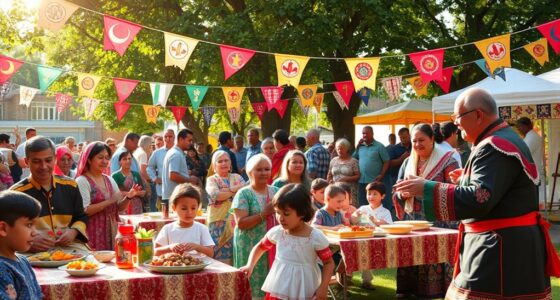To celebrate cultural holidays respectfully, start by understanding their true significance, history, and traditions. Engage with community members and cultural experts to gain authentic insights, and participate thoughtfully by following customs, attire, and rituals. Support local artisans and use respectful language to honor the culture’s artistry and symbols. Be mindful of cultural appropriation and promote inclusion in your celebrations. If you keep exploring, you’ll discover how to honor cultures genuinely and meaningfully.
Key Takeaways
- Learn and understand the holiday’s cultural, historical, or religious significance before participating.
- Engage with community members respectfully, asking questions and actively listening to gain authentic insights.
- Respect traditional attire, rituals, symbols, and customs, following guidelines to honor their cultural importance.
- Use respectful language, avoid stereotypes, and support local artisans and authentic cultural expressions.
- Be mindful of cultural appropriation, ensuring participation is genuine and does not trivialize or erase cultural meanings.
Understand the Significance of the Holiday
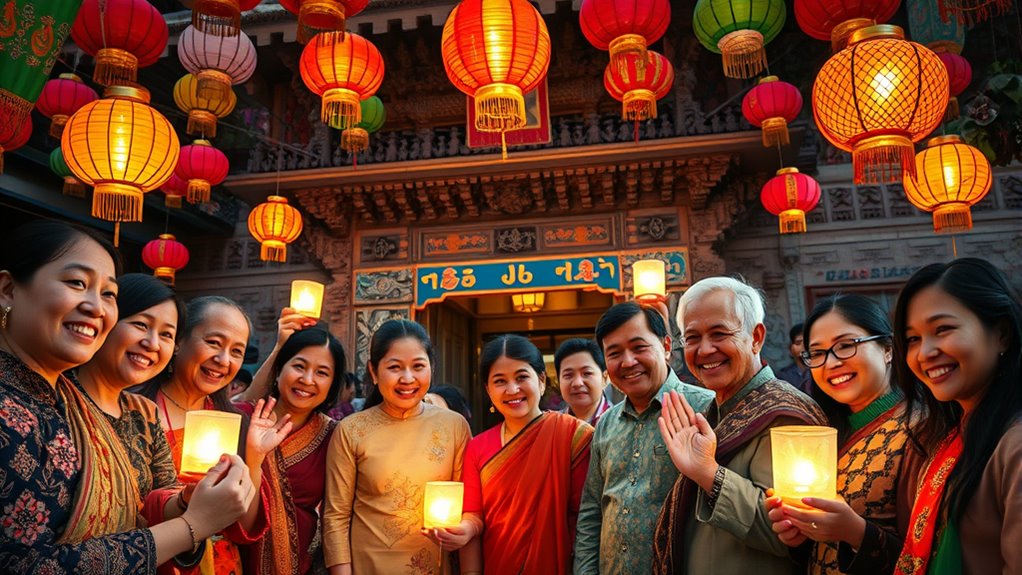
To truly celebrate a cultural holiday respectfully, you need to understand its significance. Recognizing the cultural significance helps you appreciate why the holiday matters to the community and what it represents. The holiday meaning often reflects historical events, religious beliefs, or shared values that have been passed down through generations. When you grasp these core ideas, your participation becomes more meaningful and respectful. It shows that you value the traditions and the people who observe them. Avoid superficial celebrations; instead, take the time to learn what the holiday symbolizes. This understanding fosters genuine respect and helps you engage with the festivities in an authentic way. By doing so, you demonstrate that you honor the holiday’s true purpose beyond surface-level observance. Incorporating knowledge of cultural traditions allows for a deeper appreciation and more respectful participation. Additionally, understanding the traditional themes can guide respectful expressions and avoid cultural insensitivity. Recognizing the historical context behind the holiday further enriches your understanding and demonstrates a sincere respect for its origins.
Research Cultural Traditions and Customs
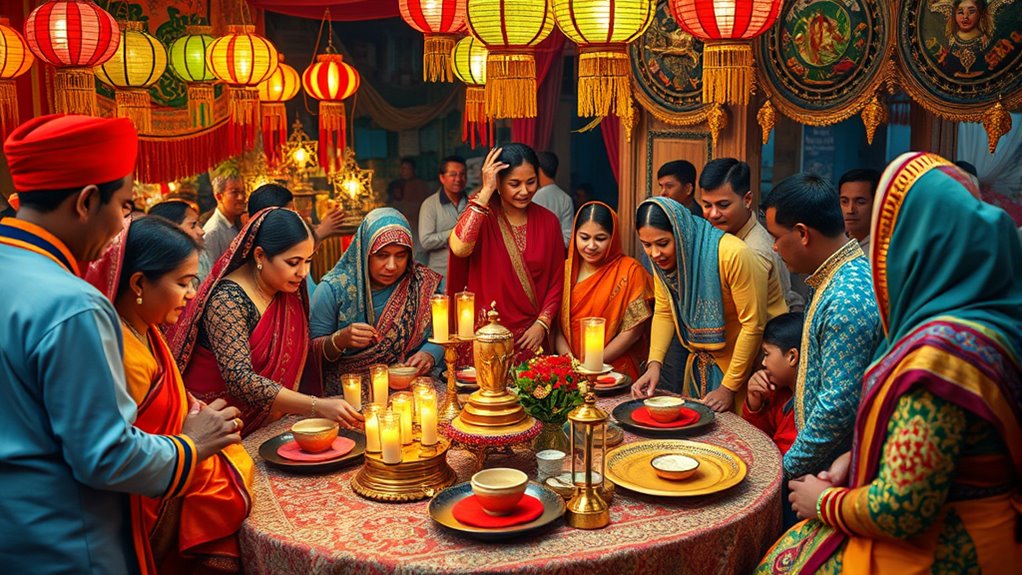
Researching cultural traditions and customs shows respect by helping you understand how people celebrate their holiday authentically. This knowledge allows you to participate thoughtfully and avoid misunderstandings. You can learn about traditional attire, which often holds cultural significance, and ceremonial rituals that mark important moments. Additionally, understanding the Vetted Flat Iron Bike options and their features can enhance your experience if your celebration involves outdoor activities or transportation. To deepen your understanding, consider exploring:
Understanding cultural traditions fosters respectful, meaningful participation in diverse holiday celebrations.
- The history behind traditional attire
- The significance of ceremonial rituals
- Typical foods served during celebrations
- Key symbols and their meanings
- Local etiquette and behaviors
Furthermore, exploring musical influences can enrich your appreciation of cultural celebrations and their unique atmospheres. Recognizing the importance of cultural preservation helps ensure respectful participation and supports the safeguarding of traditions for future generations. Paying attention to authentic decor can also help you appreciate the aesthetic elements that are integral to cultural festivities.
Engage With Community Members and Cultural Experts
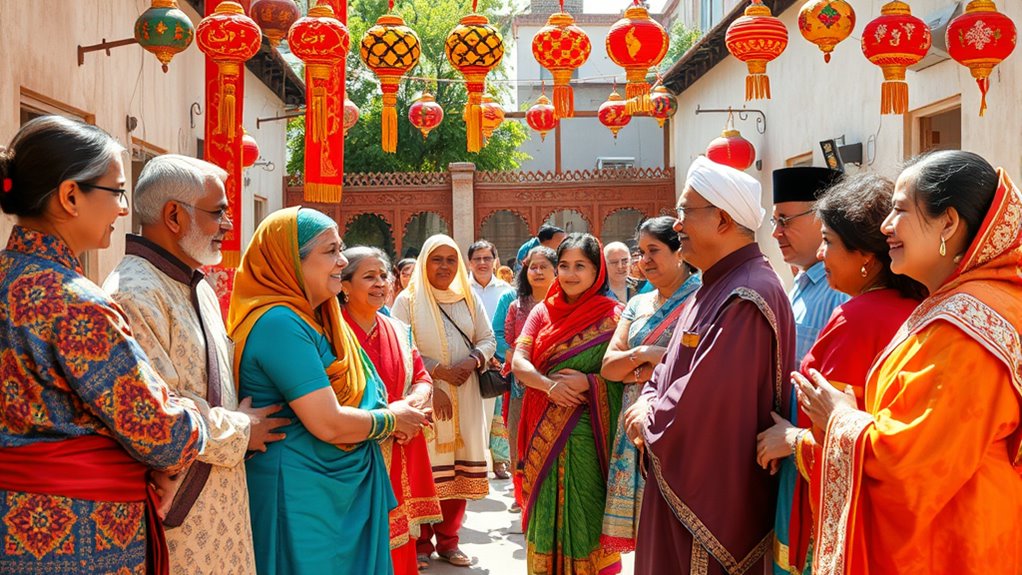
Engaging with community members and cultural experts allows you to gain authentic insights and firsthand perspectives that deepen your understanding of the holiday. Through cultural dialogue, you can learn about the significance behind traditions, symbols, and rituals, ensuring your appreciation is respectful and accurate. Building relationships within the community fosters genuine involvement, showing your commitment to honoring their customs. By asking thoughtful questions and listening actively, you demonstrate respect and openness. This direct engagement helps you avoid misunderstandings and cultural insensitivity. Remember, community involvement isn’t about observing from afar; it’s about connecting with those who keep the traditions alive. Developing cultural awareness and sensitivity through engagement enhances your ability to celebrate respectfully. Your willingness to engage thoughtfully enriches your experience and contributes to a respectful celebration of the holiday. Incorporating social-science research can also provide valuable context for understanding the deeper meanings behind traditions and practices. Additionally, understanding the role of antiques in cultural displays can help you appreciate the historical significance of artifacts used during celebrations. Recognizing equipment like traditional tools or ceremonial objects used in celebrations can further deepen your understanding of their cultural importance.
Participate Respectfully in Celebrations
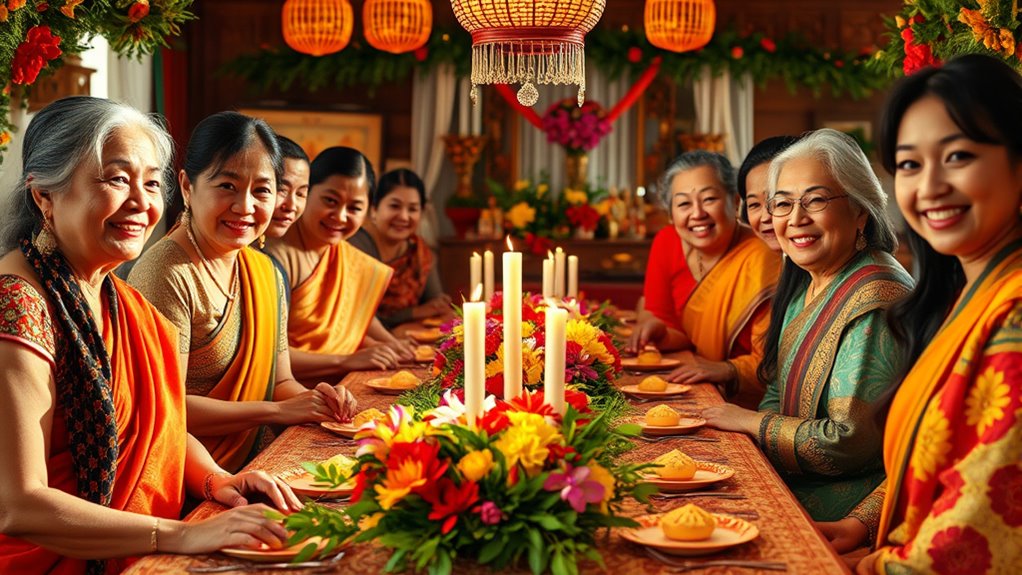
Before joining a celebration, take the time to learn about its significance and customs. As you participate, observe local traditions closely and follow any guidelines provided. Showing genuine respect and understanding helps guarantee your involvement is meaningful and respectful. Engaging in cultural sensitivity ensures that your participation honors the traditions and values of the community. Additionally, understanding different brewing techniques related to cultural rituals can deepen your appreciation and connection to the celebration. Being aware of health benefits, such as the use of traditional remedies, can also enhance your respect for the community’s practices. Recognizing the symbolism behind certain customs can further enrich your experience and demonstrate your genuine interest.
Educate Yourself First
To participate respectfully in cultural celebrations, it’s essential to educate yourself about their significance, traditions, and history. This knowledge helps prevent cultural misinterpretation and avoids reinforcing stereotypes. Take the time to learn about the origins of the holiday, the symbolism behind rituals, and appropriate behaviors. Understanding affiliate disclosures and how they influence content can also help you navigate cultural information critically and responsibly. Additionally, understanding the economic factors that influence cultural events can deepen your appreciation and awareness of their importance within global contexts. Here are some ways to start:
- Read reputable sources and cultural histories
- Talk to community members or cultural experts
- Understand the meaning behind traditional attire and symbols
- Be aware of common stereotypes and misconceptions
- Respect the context and significance of specific customs
Observe Local Customs
When participating in cultural celebrations, it’s important to observe local customs carefully. Wear traditional attire if it’s customary, showing respect for the community’s traditions. Pay attention to cultural rituals, such as specific gestures, ceremonies, or offerings, and follow them closely. Avoid interrupting or misusing symbols and practices, as they hold deep significance. Engage with the celebration actively but respectfully, showing genuine interest and reverence. If unsure about certain customs, observe others first or ask politely for guidance. Respectful participation demonstrates your appreciation for the culture and helps foster positive connections. Being mindful of these customs ensures a respectful and meaningful experience. Additionally, understanding the significance of cultural symbols can deepen your appreciation and prevent unintentional disrespect.
Show Genuine Respect
Participating respectfully in celebrations means engaging with sincerity and mindfulness. To show genuine respect, you need to practice cultural sensitivity and communicate respectfully. This involves listening carefully, avoiding assumptions, and honoring traditions even if they differ from your own. Being attentive to cues helps you navigate interactions smoothly and avoid misunderstandings. When you speak, choose your words thoughtfully—respectful communication fosters trust and connection. Remember, your attitude matters just as much as your actions. Demonstrate appreciation for the culture’s uniqueness by showing interest without appropriating. Keep an open mind, and be willing to learn. Your respectful participation not only enriches your experience but also honors the community’s values. Cultivating Cultural Intelligence can further enhance your understanding and appropriate engagement with diverse cultural practices. Developing sound design awareness can also help you better appreciate cultural expressions through audio elements, ensuring a more immersive and respectful experience.
Share and Celebrate Authentic Foods and Crafts
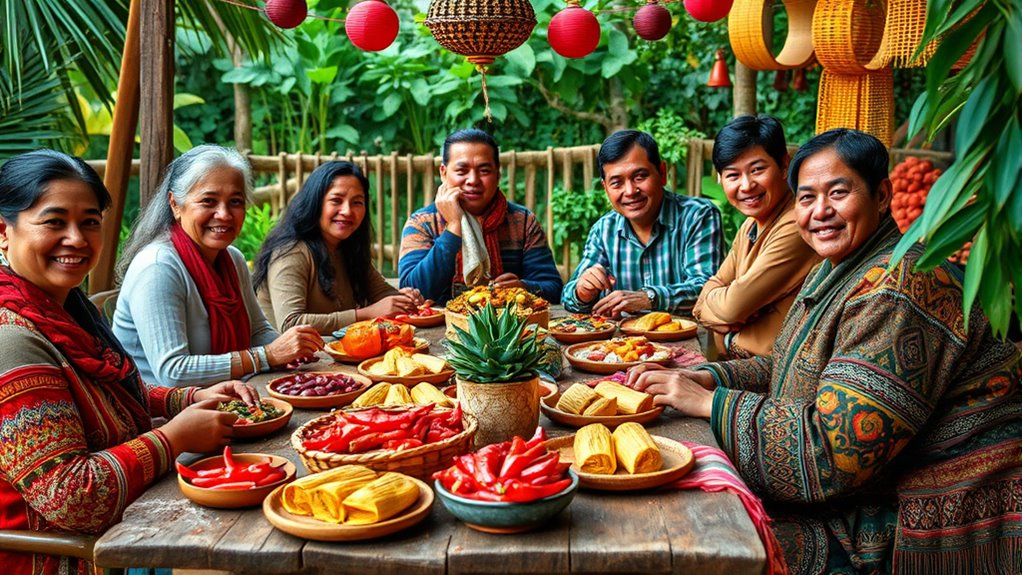
Sharing and celebrating authentic foods and crafts allows you to honor the true essence of a culture. You can do this by trying traditional recipes that have been passed down through generations, showing appreciation for their culinary heritage. When you enjoy dishes made with genuine ingredients, you support cultural authenticity. Additionally, exploring handcrafted textiles helps you understand the artistry behind a community’s craftsmanship. Wear or display these textiles proudly, acknowledging their cultural significance. By sharing these foods and crafts, you foster respect and deepen your appreciation for the culture’s history and traditions. Remember, celebrating authentically means supporting local artisans and respecting their cultural expressions. Your genuine interest and mindful participation can make your celebration more meaningful and respectful.
Avoid Stereotypes and Generalizations
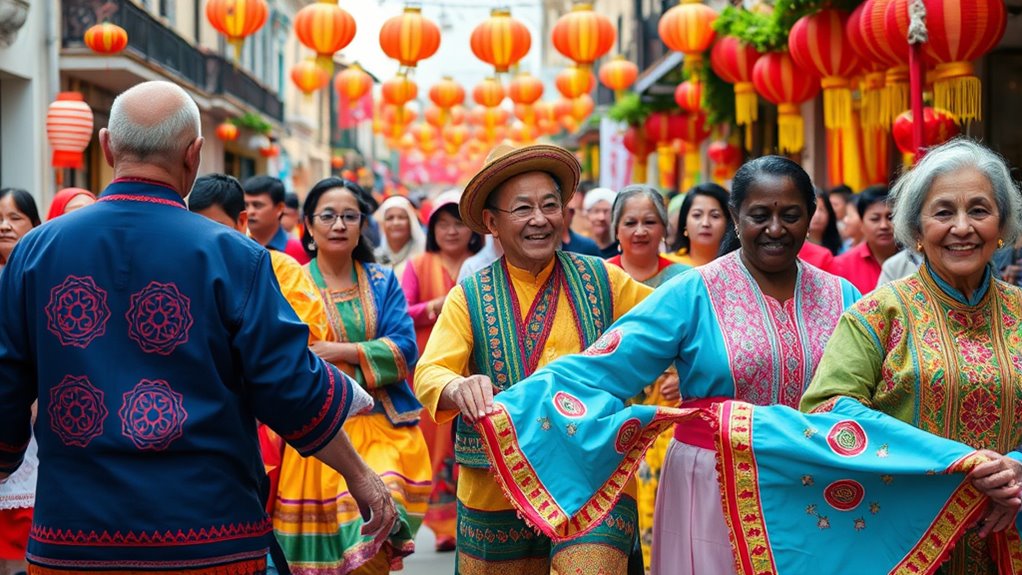
Celebrating a culture’s foods and crafts is a meaningful way to honor its traditions, but it’s equally important to avoid falling into stereotypes or broad generalizations. Relying on cultural stereotypes can oversimplify complex identities and lead to misunderstandings. To steer clear of generalization pitfalls, consider these tips:
- Avoid reducing a culture to just one or two customs or symbols
- Recognize the diversity within any cultural group
- Respect individual experiences instead of assuming everyone shares the same beliefs
- Do your research from reputable sources to gain accurate insights
- Be open to learning from community members directly, rather than relying solely on popular narratives
Support and Acknowledge Cultural Artists and Businesses
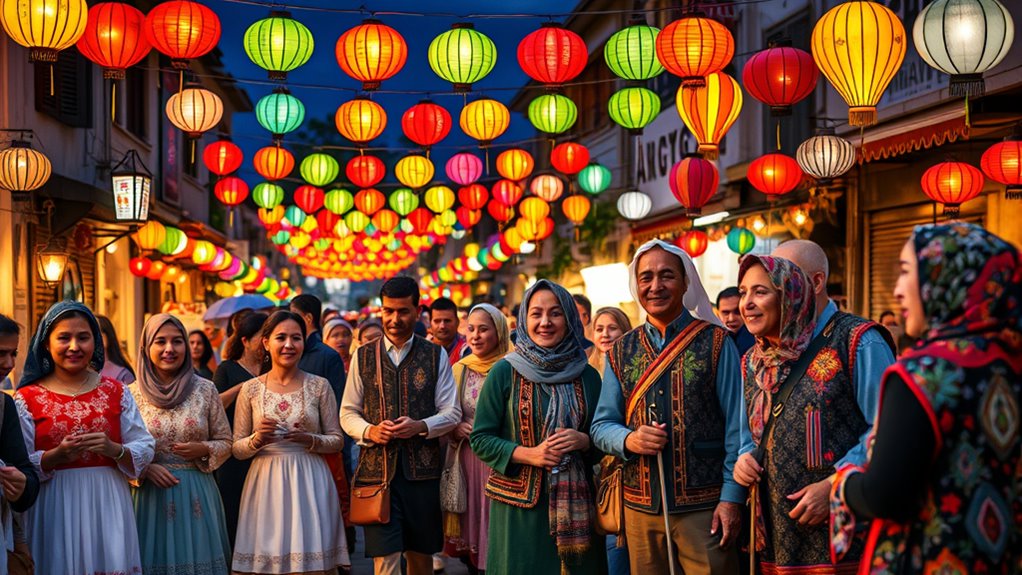
You can make a real difference by purchasing authentic cultural products regularly and sharing their stories with others. Promoting local artisans helps preserve their traditions and supports their livelihoods. When you acknowledge their efforts, you show genuine respect for their culture and craftsmanship.
Purchase Authentic Products Regularly
Supporting authentic cultural products by purchasing directly from artists and local businesses guarantees that traditions are preserved and respected. By choosing authentic souvenirs, you help sustain cultural craftsmanship and ensure artisans receive fair compensation. Regularly supporting these creators keeps traditional techniques alive and encourages the growth of cultural heritage.
- Buy handcrafted jewelry, textiles, or artwork directly from artisans
- Seek out local markets and cultural festivals for genuine products
- Avoid mass-produced imitations that dilute cultural significance
- Educate yourself on the stories behind the crafts and their origins
- Share your purchases to raise awareness about authentic cultural craftsmanship
Your commitment to buying authentic products not only enriches your experience but also promotes respectful celebration of the holiday’s cultural roots.
Promote Cultural Artisans Locally
By actively promoting local cultural artisans, you help guarantee their craft thrives within your community. Supporting artisans’ crafts at local markets not only preserves cultural traditions but also boosts the local economy. When you buy directly from these artists, you encourage the continuation of authentic artisan crafts and help sustain their businesses. You can do this by visiting markets, sharing their work on social media, or recommending them to friends. Celebrating their talent fosters appreciation and respect for cultural diversity.
| Benefits of Supporting Local Artisans | Ways to Promote Them |
|---|---|
| Preserves cultural heritage | Shop at local markets |
| Boosts local economy | Share their stories on social media |
| Encourages sustainable practices | Recommend their work to others |
| Fosters community pride | Attend cultural festivals |
Share Their Stories Widely
Sharing the stories behind cultural artisans and businesses amplifies their voices and brings their work to a wider audience. By highlighting their storytelling empathy, you help others understand the significance of their craft and cultural heritage. When you share their stories on social media, in community events, or through local media, you foster appreciation and respect. This not only supports their livelihood but also preserves traditions for future generations. Engaging storytelling empathy creates a genuine connection, making their work more meaningful to your audience. To effectively share their stories, consider:
- Featuring interviews and personal narratives
- Showcasing their creative process
- Highlighting cultural significance
- Promoting their products authentically
- Encouraging community involvement
This approach ensures their stories resonate and inspire lasting respect.
Use Respectful Language and Proper Terminology
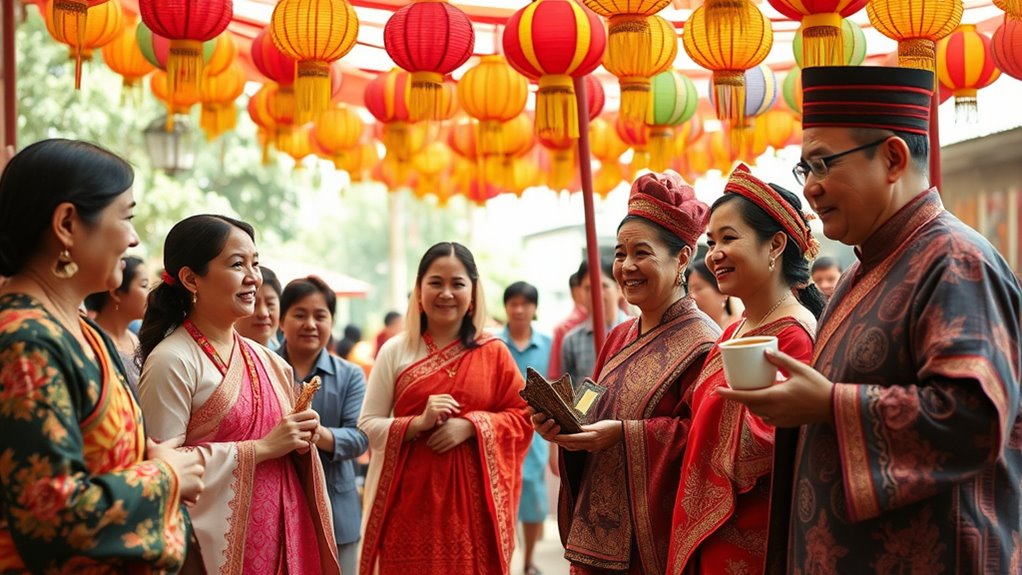
Using respectful language and proper terminology is essential when celebrating cultural holidays, as it shows genuine appreciation and avoids misunderstandings. When you choose words carefully, you demonstrate cultural sensitivity and respect for traditions. Avoid slang or stereotypes that could be misinterpreted or offensive. Instead, learn and use the correct terms for cultural practices, attire, and symbols. This not only fosters understanding but also shows you value the community’s identity. Be mindful of how language can influence perceptions, and always opt for respectful expressions. If you’re unsure about terminology, do some quick research or ask members of the community. Using respectful language helps create an inclusive environment where everyone feels honored and respected during celebrations.
Reflect on Cultural Appropriation and Its Impacts

Cultural appropriation occurs when members of one culture adopt elements of another culture without understanding or respecting their significance, often leading to misunderstandings and harm. This can blur cultural boundaries and undermine identity preservation. When you take cultural symbols or practices out of context, you risk erasing their meaning and disrespecting the originating community. Reflecting on this helps you recognize the importance of honoring origins and avoiding stereotypes.
Cultural appropriation risks erasing meaning and disrespecting communities when elements are taken out of context.
- Respect the cultural context behind traditions and symbols
- Educate yourself about their significance before participating
- Avoid commercializing or trivializing sacred elements
- Support authentic voices from the culture
- Be mindful of power dynamics involved in cultural sharing
Understanding these impacts encourages respectful celebration and helps preserve cultural integrity.
Foster Ongoing Cultural Awareness and Sensitivity
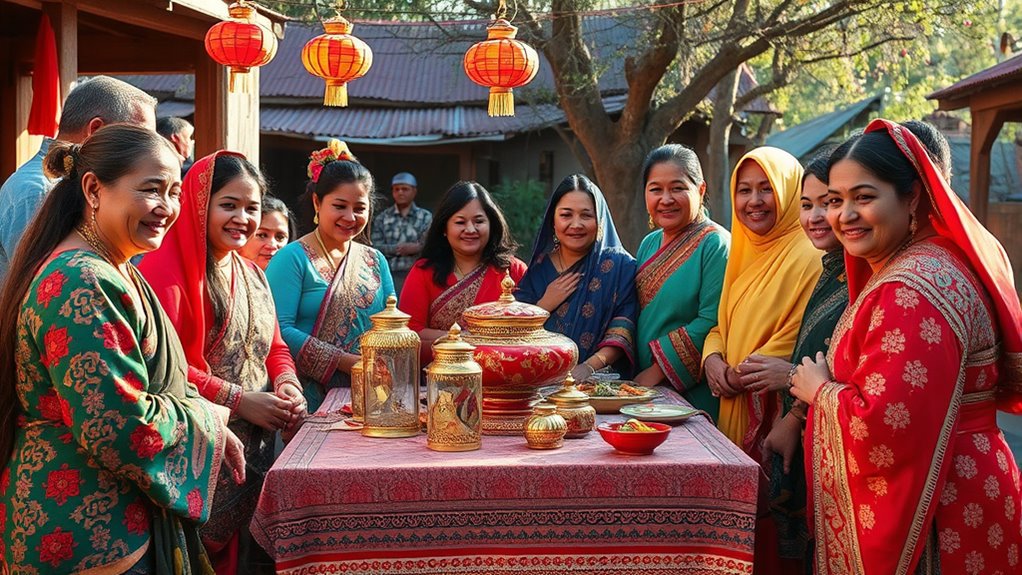
To foster ongoing cultural awareness and sensitivity, you should actively seek out opportunities to learn about different traditions and histories. Respect religious practices by listening and following guidelines, even if they differ from your own beliefs. Encourage inclusive celebrations that honor every community’s perspectives, creating a more respectful and understanding environment.
Engage in Cultural Education
How can you deepen your understanding of different cultures beyond just celebrating their holidays? Engaging in cultural education helps you appreciate traditions, values, and symbols more fully. You might explore the significance of traditional attire or learn what cultural symbols represent. Attending workshops, reading books, or taking language classes can broaden your perspective. To stay respectful and informed, consider these actions:
- Visit cultural museums or exhibitions
- Participate in cultural workshops or cooking classes
- Study authentic traditional attire and its history
- Learn about the meaning behind cultural symbols
- Connect with community members for firsthand insights
Respect Religious Practices
Understanding and respecting religious practices is essential for fostering genuine cultural sensitivity. By engaging in interfaith dialogue, you can learn about different beliefs and customs, promoting mutual understanding. Show respect by observing dress codes, refraining from disruptive behaviors, and honoring sacred rituals. Recognizing the importance of religious tolerance helps create an inclusive environment where everyone feels valued. When participating in religious events or holidays, ask questions politely and listen actively to gain deeper insight. Avoid making assumptions or dismissing practices that are unfamiliar to you. Your openness and respect can bridge cultural gaps, encouraging ongoing awareness. Ultimately, honoring religious practices demonstrates your commitment to fostering respectful, harmonious interactions across diverse communities.
Promote Inclusive Celebrations
Promoting inclusive celebrations encourages ongoing cultural awareness and sensitivity by actively involving diverse communities in holiday observances. This approach fosters respectful communication and highlights the importance of understanding different traditions. To create truly inclusive celebrations, consider these actions:
- Invite representatives from various cultural groups to share their perspectives
- Incorporate traditions from multiple cultures into event planning
- Use language that respects and acknowledges different backgrounds
- Educate yourself and others about cultural sensitivities
- Encourage open dialogue to address questions or concerns
Frequently Asked Questions
How Can I Recognize Genuine Cultural Practices From Commercialized Versions?
To recognize genuine cultural practices from commercialized versions, you should look for authentic traditions rooted in history and community. Pay attention to cultural symbolism, such as specific rituals and attire, that hold deep meaning. If a celebration feels superficial or overly commercialized, it might lack respect for the tradition’s origins. Engage with local community members or cultural experts to better understand the true significance behind the practices, ensuring your participation is respectful and authentic.
What Are Respectful Ways to Handle Cultural Misunderstandings or Mistakes?
When you face cultural misunderstandings or mistakes, use sincere apology strategies that acknowledge the impact of your actions. Practice active listening to truly understand the other person’s perspective, which shows respect and a willingness to learn. If you realize you’ve erred, apologize promptly and humbly, and ask how you can make amends. This approach fosters trust, demonstrates respect, and helps you grow in cultural awareness.
How Do I Avoid Overstepping Boundaries When Participating in Cultural Celebrations?
When participating in cultural celebrations, you should prioritize cultural sensitivity by learning about the traditions beforehand. Ask respectful questions and listen carefully to avoid overstepping boundaries. Remember, respectful participation involves following established customs and practices, and being open to correction. If you’re unsure, it’s better to observe rather than participate. This approach shows your genuine respect and helps you engage meaningfully without causing offense.
What Are Effective Methods to Support Underrepresented Cultural Artisans?
Imagine weaving a tapestry where every thread counts. To support underrepresented cultural artisans, engage in authentic artisan collaborations that honor their craftsmanship. You can buy directly from artisans, promote their work, or partner with organizations dedicated to cultural craftsmanship. These actions empower artisans, preserve traditions, and amplify diverse voices. Your support becomes a crucial part of a vibrant cultural mosaic, ensuring their artistry thrives for generations to come.
How Can I Incorporate Cultural Awareness Into Everyday Interactions Beyond Holidays?
You can incorporate cultural awareness into daily interactions by practicing language sensitivity, choosing words carefully, and avoiding stereotypes. Show genuine curiosity and listen actively to learn about others’ experiences. Embrace cultural humility by acknowledging what you don’t know and being open to new perspectives. Small acts like respecting traditions, asking respectful questions, and appreciating diversity help foster understanding and create inclusive environments beyond just holidays.
Conclusion
By understanding the significance, respecting traditions, engaging sincerely, sharing authentically, supporting genuinely, using thoughtfully, reflecting deeply, and fostering awareness, you create meaningful connections. You honor cultures, promote respect, and build bridges. You listen openly, learn continuously, celebrate genuinely, and grow personally. Through these actions, you help preserve rich traditions, challenge stereotypes, and cultivate a world where every celebration is celebrated with respect, understanding, and love—making every holiday a true reflection of unity and appreciation.
